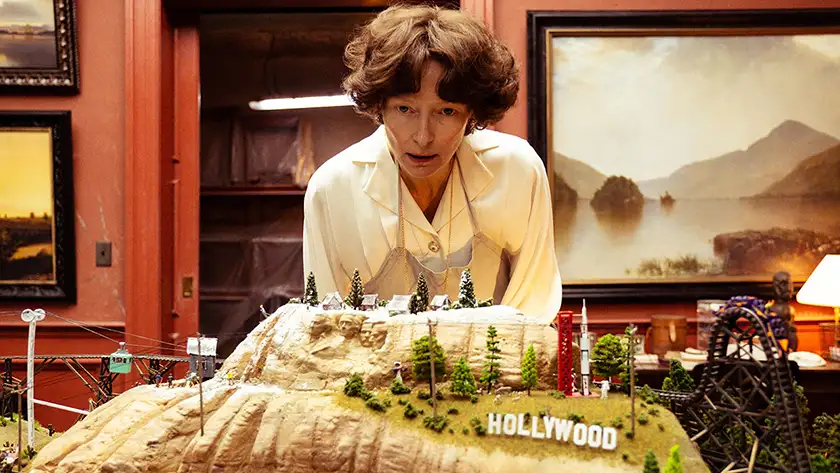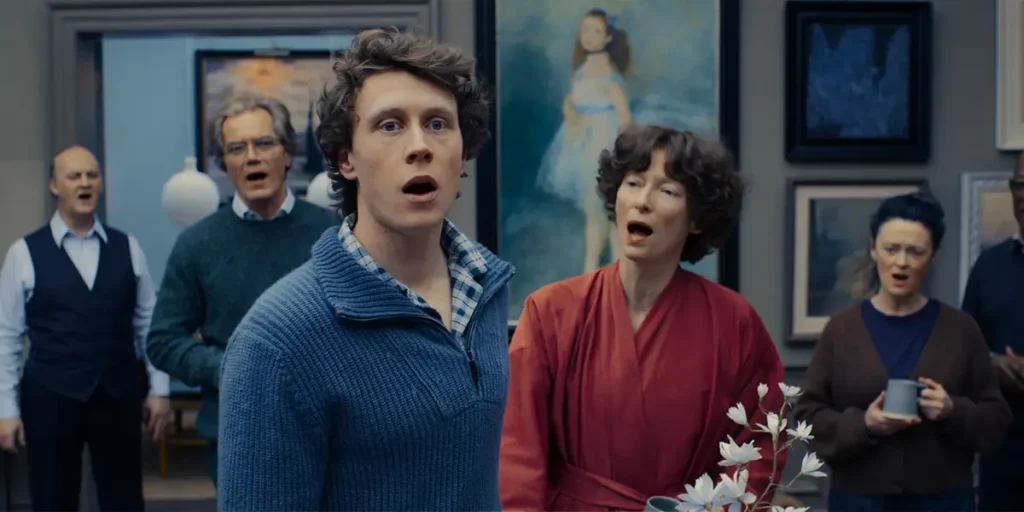Joshua Oppenheimer’s masterful post-apocalyptic musical The End soars on gorgeous filmmaking, confidence and raw emotion.
Director: Joshua Oppenheimer
Genre: Musical, Sci-Fi, Fantasy
Run Time: 148′
BFI London Film Festival Screening: October 11-17, 2024
U.S. Release Date: December 6, 2024 (limited)
U.K. & Ireland Release Date: March 28, 2025
Where to Watch The End: in US theaters and UK & Irish cinemas
A good musical can adapt to tonal shifts and dark twists, if handled with care. People are still humming tunes from La La Land while dabbing the tears away. However, 2024 is the year when mainstream movie musicals stopped giving a damn and embraced the darkness. Three notable films have attracted attention for marrying lurid subject matter to showstopping tunes. What Emilia Pérez’s approach to drug cartels, vaginoplasties and mass graves lacks in tact, it makes up for in confidence. Meanwhile, Joker: Folie à Deux mistakes seriousness with just being dour, and leaves the audience feeling like clowns.
To complete an unlikely trilogy, we get The End. This could have had the campest approach to a post-apocalyptic story this side of Roland Emmerich, but it comes from a director who has turned unlikely displays of artistic expression into masterpieces before, and thankfully, he’s done it again.
Joshua Oppenheimer’s career as a filmmaker rests almost entirely on the backs of the one-two documentary gut punch of The Act of Killing and its follow-up The Look of Silence. It’s still puzzling how he could extract willing performances out of one-time murderers to illustrate their crimes, but it does make the idea of a musical set in an underground cavern after the world has been destroyed less daunting. Our subjects this time have a touch more polish.
The End centers on a couple (Husband and wife Michael Shannon and Tilda Swinton) and their adult son (George Mackay), who have been ensconced in a plush underground lair for two decades, with just their hired help (Bronagh Gallagher, Lennie James and Tim McInnerny) and the trappings of their wealth for company. Apparently, rearranging Monets and Renoirs on the wall can help stave off cabin fever when the world on the surface has burned to a crisp. It also helps to release any feelings in song.
The musical element of The End is its most intriguing. Our (post-)nuclear family intermittently switches into a musical number to the strains of a sumptuous score by Josh Schmidt and Marius de Vries, with lyrics by Oppenheimer and Rasmus Heisterberg. When they do so, Oppenheimer’s focus is squarely on the actors, avoiding ostentatious camera moves unless the actors are specifically moving in the space. Both the songs and the way their performances are shot are full of purpose. The End is not a wall-to-wall extravaganza of song.
In this heightened setting, Oppenheimer could introduce any amount of musical numbers just to show that he could. However, he’s too considerate and precise a storyteller to be unnecessarily ostentatious. The songs carry the emotion when words are not enough, but the most endearing moments come at the end, when the performers stop and regard their settings and each other in silence. The End is about people filling space, time and silence however they can to avoid confronting the truths that exist in front of them.
As the last remnants of human society after global catastrophe, there is some survivor’s guilt at play in this household, but that’s not the point of The End. Despite the title, Oppenheimer is not interested in making an elegy. The End is about trying to restart and find a way forward, and how that has to happen in spite of the existing status quo. Such survival dramas need someone to arrive from the outside to disrupt our leads’ ordered lives. The interloper (Moses Ingram) arrives to the shock and concern of the family, but she sparks something in the son, as the first new face he’s seen in his life.
All the actors have the capacity to surprise (Who knew Shannon or Swinton could sing? Or that McInnerny could tapdance?), though Mackay shines brightest, displaying a capacity for song and dance that stands in stark contrast to his more restrained and repressed characters in Bonello’s The Beast. He is the beating heart of The End, trying to bridge the gap between his parents’ paranoid caution, and the prospect of new love and joy.
As The End goes on, and the lives of its characters continue in their isolated cavern, Oppenheimer’s camera is forever inviting them to let their true thoughts come out, and it results in more beautiful songs, or more strangely identifiable moments of human drama. Even in the depth of post-apocalyptic despair, we still regret the mistakes we made, and we still worry about the future, even when that future is not guaranteed.

Commentary on the damage wrought by climate change is naturally present in this scenario, but anyone angry at Oppenheimer’s refusal to judge these oil baron and energy resellers for their role in the climate catastrophe misses the point. They have to answer to their own kin and closest companions first, and The End is a profound rumination on how to do just that. We lie to ourselves and those around us to be happy, but in Oppenheimer’s world, the truth can be as warm and welcoming as a favourite song.
The End was screened at the BFI London Film Festival on October 11-17, 2024 and opened in select US theaters on December 6, 2024. The film will be released in cinemas in the UK & Ireland on March 28, 2025.

